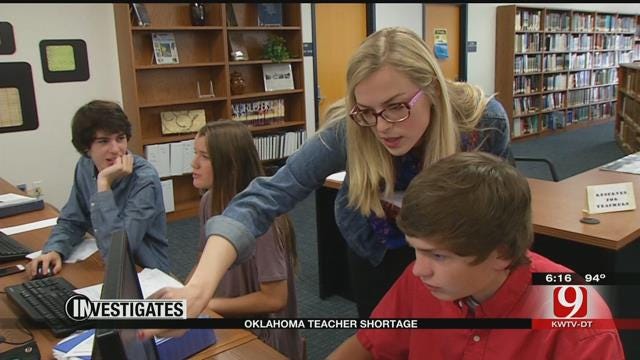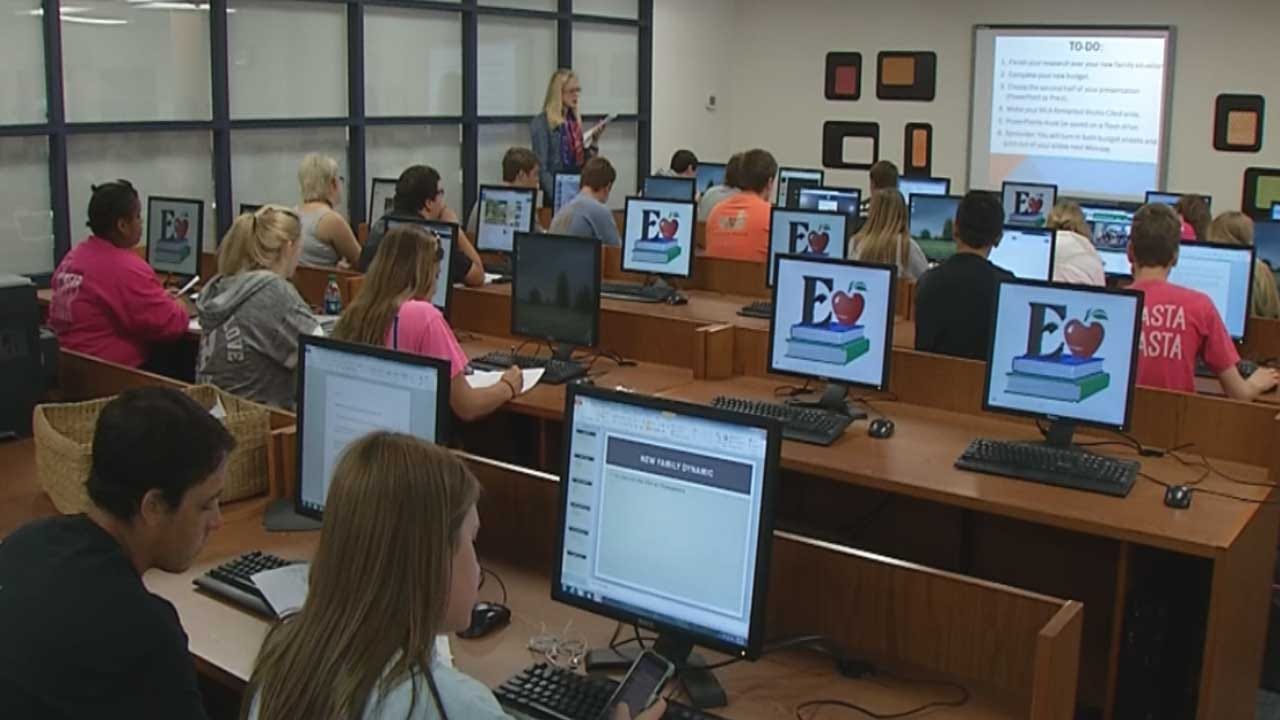9 Investigates: Teacher Shortage In State Not Likely To End Anytime Soon
State education officials had hoped to make progress in reducing the teacher shortage for the upcoming school year, but it doesn't look promising and, in fact, could be worse.Wednesday, July 29th 2015, 7:12 pm
State education officials had hoped to make progress in reducing the teacher shortage for the upcoming school year, but it doesn't look promising and, in fact, could be worse.
While this makes it easier for graduating education majors to find jobs, the shortage makes it less likely they will stay in that job and thus will only exacerbate the problem.
No one understands that better than Haley Sherrard.
Two years out of college, Sherrard, bright and energetic, has the compassion schools want and the excellence Oklahoma needs. And yet she's already wondering how long she can keep this up.
"It's hard for me to see how this would be a sustainable lifestyle," Sherrard told 9 Investigates in an interview at the end of the 2014-2015 school year.
The Edmond North High School English teacher said she's had to sacrifice more personal time than she imagined possible. That's because her classes are all larger than they should be, a direct result of the teacher shortage.
"Teachers are miracle workers, they're willing to sacrifice to make it happen, and we do it each and every day, but, anything less than what we have right now would be great. I mean, it's amazing how large [the classes] are," she said.
9 Investigates sorted through data from the State Department of Education, comparing class sizes from a decade ago with last year.
While there are exceptions, 9 Investigates consistently found that basic classes -- English, math, science, and history -- are four to five students larger now. The disparity is even worse -- 10 or more students larger -- in advanced placement courses we examined.
What is the root cause?
One thing seems clear: Oklahoma's teacher shortage is not due to the state producing fewer teachers.
"I know that we're turning out quality candidates at record numbers," said Kim Pennington, coordinator of school partnerships for UCO's College of Education and Professional Studies.
Well over 100 of those candidates attended a recent teacher job fair at UCO and saw firsthand how school districts are competing for their services, perhaps, like never before.
"We see about 60 percent of our student teacher candidates have job offers before they're done student teaching," said Pennington.
Districts that haven't had to recruit teachers before are now out selling themselves. Those who've been in the field for years say the change is noticeable.
"You come to a career fair like this today, and they're being recruited from out of state -- to go to Texas, to go to Kansas, to go to Missouri," said Amber Fitzgerald with Enid Public Schools.
The students say it's overwhelming, but also very tempting.
"Yes, it is," said Margaret Stewart, an Arkansas native who got her degree at UCO because her husband is stationed nearby.
Stewart said a desire to get back home is one reason she would look outside Oklahoma for a teaching job. Another reason, quite simply, is pay. She says it's certainly no secret to aspiring teachers that just about every other state pays its teachers more than Oklahoma.
"I mean, depending on which districts you're comparing, " said Stewart, "it's up to $15,000 dollars difference starting out."
According to the National Education Association, Oklahoma is 48th in average teacher salary, at $44,549. That's $12,000 below the national average, and anywhere from $1,000 to $5,000 less than every state in the region.
"We must compete with the surrounding states," said state Superintendent Joy Hofmeister.
Hofmeister has a plan to increase teacher pay $5,000 over the next five years, but in the face of a $600 million budget shortfall this past legislative session, state lawmakers didn't provide the initial increase she was seeking.
The governor and legislative leadership touted the fact that, in a tough budget year, they were able to hold education funding flat. But, with the number of students continuing to grow, critics point out, a flat budget means a net decrease -- districts will have to cut more positions and the teacher shortage will worsen.
And that means teachers like Sherrard will find it harder still to connect with their students in a meaningful way, could get discouraged and decide it is not a sustainable lifestyle, especially for what they're being paid.
"The pressure's on," said Sherrard. "The cards are stacked against you when you've got 150 kids and you've got work coming in constantly."
UCO education officials say they're already seeing teachers leaving the profession in record numbers. They cite low pay and high stress as the primary reasons.
More Like This
November 13th, 2024
October 28th, 2024
October 17th, 2024
Top Headlines
November 24th, 2024
November 24th, 2024
November 24th, 2024
November 23rd, 2024










